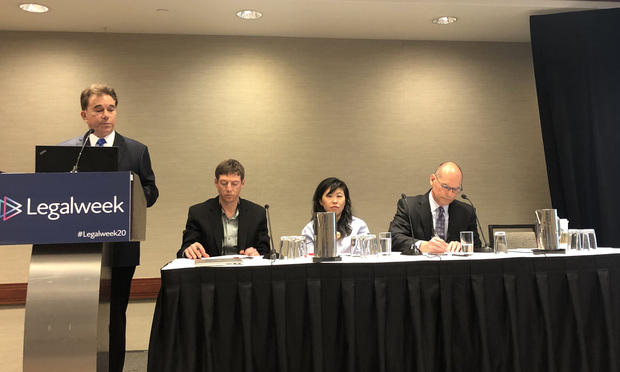In-House Counsel Should Show Legal Department Data Analysis to Business Leaders
Learning how to use and analyze that data can help general counsel show their value to the C-suite was discussed the collection and analysis of data on a panel titled "Data Analytics From the Top Down: What GCs, Law Firm Leaders and the C-Suite Should Know About Data Analytics" at ALM's annual Legalweek conference at the New York Hilton Midtown on Wednesday.
February 05, 2020 at 04:21 PM
3 minute read
 (Left to right) Ralph Baxter, co-host of Law Technology Now; Karl Harris, CEO of Lex Machina; Jae Um, director of pricing strategy at Baker McKenzie; and Mark Smolik, chief legal and compliance officer at DHL Supply Chain speaking at Legalweek at the New York Hilton Midtown. Photo: Daniel Clark/ALM
(Left to right) Ralph Baxter, co-host of Law Technology Now; Karl Harris, CEO of Lex Machina; Jae Um, director of pricing strategy at Baker McKenzie; and Mark Smolik, chief legal and compliance officer at DHL Supply Chain speaking at Legalweek at the New York Hilton Midtown. Photo: Daniel Clark/ALM
Companies have more data on hand than ever before. Learning how to use and analyze that data can help general counsel show their value to the C-suite.
In-house counsel and legal experts discussed the collection and analysis of data on a panel titled "Data Analytics From the Top Down: What GCs, Law Firm Leaders and the C-Suite Should Know About Data Analytics" at ALM's annual Legalweek conference at the New York Hilton Midtown on Wednesday.
Mark Smolik, the chief legal and compliance officer at DHL Supply Chain in Westerville, Ohio, said when he first started at DHL the company was outsourcing too much work to law firms.
"My initial reaction when I came to the organization was 'We have a broken model,'" Smolik said. "Twenty percent of our costs were internal and 80% were external."
Smolik said he worked with a finance team to look at the matters that were being completed by the legal department and the matters law firms were handling. He ultimately decided to bring commodity work, procurement contracts and commercial real estate to the in-house legal team at DHL.
"The visibility of that data wasn't any innovative way of thinking it was just thinking of whether we can do things better, faster and cheaper," Smolik said. "Surely we can so we brought that work in-house."
Data is the most valuable, Smolik said, when he shows business leaders how the legal department is creating value to the organization as a whole.
"Where law departments are going is, more likely than not, hiring businesspeople to lead that law department who happen to have law degrees," Smolik said.
Legal leaders who want to begin using data to find ways to create value should take a top-down approach. Jae Um, pricing director at Baker McKenzie in New York, said leaders of legal departments and law firms should take an "appreciative inquiry" when analyzing data.
"Data is not magic. It is work. It costs time and money and there is risk involved," Um said.
Taking a bottom-up approach when analyzing data can be "perilous and time-consuming," she said, adding that it's easy to spend too much time analyzing the wrong data sets.
"One of the problems that we can't see is one of data sufficiency," Um said. "We do have a lot of data, but when you frame up the problem that you're trying to solve sometimes you don't have all of the data you need to solve that particular problem."
Um noted the best approach is beginning at a point of how the analysis will work and contemplating what information is needed to complete the analysis.
This content has been archived. It is available through our partners, LexisNexis® and Bloomberg Law.
To view this content, please continue to their sites.
Not a Lexis Subscriber?
Subscribe Now
Not a Bloomberg Law Subscriber?
Subscribe Now
NOT FOR REPRINT
© 2025 ALM Global, LLC, All Rights Reserved. Request academic re-use from www.copyright.com. All other uses, submit a request to [email protected]. For more information visit Asset & Logo Licensing.
You Might Like
View All
FTC Sues PepsiCo for Alleged Price Break to Big-Box Retailer, Incurs Holyoak's Wrath
5 minute read
Wells Fargo and Bank of America Agree to Pay Combined $60 Million to Settle SEC Probe

‘Extremely Disturbing’: AI Firms Face Class Action by ‘Taskers’ Exposed to Traumatic Content
5 minute read
MLB's Texas Rangers Search for a New GC and a Broadcasting Deal
Law Firms Mentioned
Trending Stories
- 1With New Civil Jury Selection Rule, Litigants Should Carefully Weigh Waiver Risks
- 2Young Lawyers Become Old(er) Lawyers
- 3Caught In the In Between: A Legal Roadmap for the Sandwich Generation
- 4Top 10 Developments, Lessons, and Reminders of 2024
- 5Gift and Estate Tax Opportunities and Potential Traps in 2025 for Our New York High Net Worth Clients
Who Got The Work
J. Brugh Lower of Gibbons has entered an appearance for industrial equipment supplier Devco Corporation in a pending trademark infringement lawsuit. The suit, accusing the defendant of selling knock-off Graco products, was filed Dec. 18 in New Jersey District Court by Rivkin Radler on behalf of Graco Inc. and Graco Minnesota. The case, assigned to U.S. District Judge Zahid N. Quraishi, is 3:24-cv-11294, Graco Inc. et al v. Devco Corporation.
Who Got The Work
Rebecca Maller-Stein and Kent A. Yalowitz of Arnold & Porter Kaye Scholer have entered their appearances for Hanaco Venture Capital and its executives, Lior Prosor and David Frankel, in a pending securities lawsuit. The action, filed on Dec. 24 in New York Southern District Court by Zell, Aron & Co. on behalf of Goldeneye Advisors, accuses the defendants of negligently and fraudulently managing the plaintiff's $1 million investment. The case, assigned to U.S. District Judge Vernon S. Broderick, is 1:24-cv-09918, Goldeneye Advisors, LLC v. Hanaco Venture Capital, Ltd. et al.
Who Got The Work
Attorneys from A&O Shearman has stepped in as defense counsel for Toronto-Dominion Bank and other defendants in a pending securities class action. The suit, filed Dec. 11 in New York Southern District Court by Bleichmar Fonti & Auld, accuses the defendants of concealing the bank's 'pervasive' deficiencies in regards to its compliance with the Bank Secrecy Act and the quality of its anti-money laundering controls. The case, assigned to U.S. District Judge Arun Subramanian, is 1:24-cv-09445, Gonzalez v. The Toronto-Dominion Bank et al.
Who Got The Work
Crown Castle International, a Pennsylvania company providing shared communications infrastructure, has turned to Luke D. Wolf of Gordon Rees Scully Mansukhani to fend off a pending breach-of-contract lawsuit. The court action, filed Nov. 25 in Michigan Eastern District Court by Hooper Hathaway PC on behalf of The Town Residences LLC, accuses Crown Castle of failing to transfer approximately $30,000 in utility payments from T-Mobile in breach of a roof-top lease and assignment agreement. The case, assigned to U.S. District Judge Susan K. Declercq, is 2:24-cv-13131, The Town Residences LLC v. T-Mobile US, Inc. et al.
Who Got The Work
Wilfred P. Coronato and Daniel M. Schwartz of McCarter & English have stepped in as defense counsel to Electrolux Home Products Inc. in a pending product liability lawsuit. The court action, filed Nov. 26 in New York Eastern District Court by Poulos Lopiccolo PC and Nagel Rice LLP on behalf of David Stern, alleges that the defendant's refrigerators’ drawers and shelving repeatedly break and fall apart within months after purchase. The case, assigned to U.S. District Judge Joan M. Azrack, is 2:24-cv-08204, Stern v. Electrolux Home Products, Inc.
Featured Firms
Law Offices of Gary Martin Hays & Associates, P.C.
(470) 294-1674
Law Offices of Mark E. Salomone
(857) 444-6468
Smith & Hassler
(713) 739-1250






